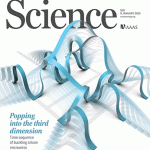 Less than three months after publishing a paper in Science which they claim to have been able to detect the spin of a single proton, the authors have retracted it for “a potentially serious issue with the main conclusion.”
Less than three months after publishing a paper in Science which they claim to have been able to detect the spin of a single proton, the authors have retracted it for “a potentially serious issue with the main conclusion.”
Here’s the notice:
Our Report “Single-proton spin detection by diamond magnetometry” (1) presents measurements on near-surface nitrogenvacancy centers in diamond. In these measurements, we observed signals that showed all the characteristics expected from single-proton nuclei. This interpretation was based on the three criteria of the Zeeman effect, quantum-coherent coupling, and (in one occasion) on a before/after-type control experiment.
We have discovered a potentially serious issue with the main conclusion in the paper, namely the “detection of a single-proton spin.” Specifically, we have recognized that resident carbon-13 nuclei within the diamond can mimic single-proton behavior, challenging our interpretation. Carbon-13 can produce quantum-coherent signals at the proton nuclear magnetic resonance frequency, and the scaling of frequency with magnetic field is indistinguishable from that of single protons within the measurement error. This behavior is due to an unrecognized effect that occurs with the dynamical decoupling sequence used for signal detection. We provide a detailed description of this behavior in a separate article (2).
Our Science Express Report claims single-proton spin detection in three instances. We find that two of these instances are ambiguous and can be explained by either single proton or single carbon-13, whereas the third instance can only be explained by single proton. Because this is only a single data point, we are not confident that it provides sufficient basis to support our claim of “single-proton spin detection.” We therefore retract the Report.
The study does not seem to have garnered much coverage.
It looks like Lorentz et al. discovered the problem themselves (just a couple of months after publishing the Nature paper – ouch) and quickly moved to correct the record.
They could have brushed the problem under the carpet, and waited for someone else to spot it years later, but instead they showed admirable integrity.
Sure, they did the right thing.
The problem, again, was the lure of getting a publication into Nature/Science ASAP. I fully understand the eagerness and excitement, but in cases where big discoveries are claimed, waiting and verifying multiple times seems wiser. Nature/Science constitute a dangerous trap.
This is good science. Say what you think is the case. If you later realize you were wrong, say “Sorry, we now don’t think X is necessarily the case, as it may instead have been Y.”
In everyday behavior, correcting oneself is normal; in science (especially in my field, medical science) it is rare. The clear and prompt response by this group should encourage us all to behave normally.